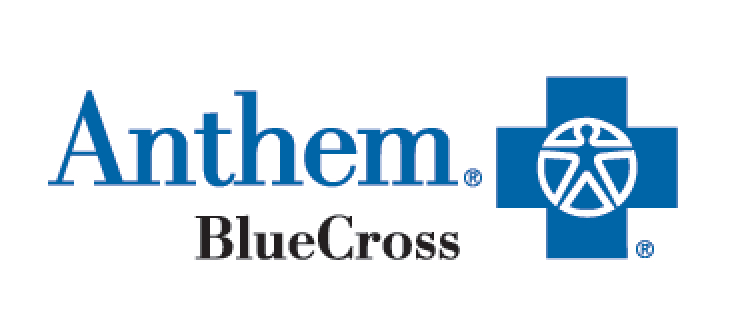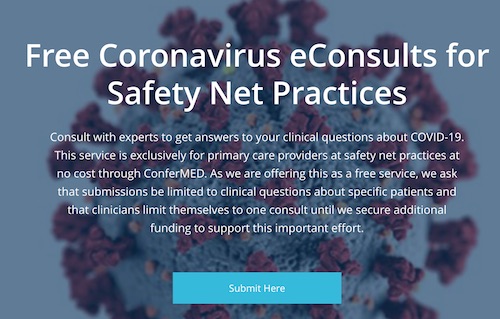E-CONSULT NEWS
Anthem Blue Cross of California Expands Its E-Consult Program for the Safety-Net (June 2020)
In response to the intensification of healthcare inquity during the COVID-19 pandemic, Anthem Blue Cross of Califonia has broadly expanded its virtual care program to improve healthcare access for its 1.2 million Medi-Cal members. As part of the expansion, primary care practices can now offer immediate specialty care access to Anthem Medi-Cal members through ConferMED’s e-consult platform.  ConferMED provides e-consult access to 40 specialties and subspecialities, which enables primary care providers to deliver specialty care to patients safely during the pandemic.
ConferMED provides e-consult access to 40 specialties and subspecialities, which enables primary care providers to deliver specialty care to patients safely during the pandemic.
“The demand for specialty care outpaces the number of specialists available to serve Californians. Underserved populations, such as those who live in remote areas, have income restraints, or experience transportation barriers, can have a much harder time accessing care. It is less likely for individuals to seek care or adhere to treatment programs from doctors they do not know or understand, so Anthem is using our eConsult initiative to help our partnering providers build stronger health homes, improve health outcomes, and simplify care for Anthem Medi-Cal members,”expained Joel Gray, Anthem Blue Cross CA Medicaid Executive Director, in State of Reform News.
For Medi-Cal patients and primary care providers at 54 safety-net centers throughout California, the safe and timely specialty care access enabled through e-consults is provided at no additional cost. Learn more about Anthem’s new ConferMED e-consult access offering here.
“After the pandemic, visiting the doctor will never be the same. And that’s fine.” (May 11, 2020)
 This May, Michael Barnett, MD, Brigham and Women’s Hospital primary care provider and assistant professor at Harvard T.H. Chan School of Public Health, published an opinion piece on virtual care in the Washington Post. Barnett describes how primary care can be delivered without “tethering doctors to an exam room” because healthy patients can be “mostly be managed by phone.” Regarding econsults, he also states that “up to one-third of referrals to specialists could be resolved with eConsults, without an additional appointment.” The March 26th E-Consult Workgroup Webinar included a presentation from Barnett about virtual care and econsults: Webinar recording available here.
This May, Michael Barnett, MD, Brigham and Women’s Hospital primary care provider and assistant professor at Harvard T.H. Chan School of Public Health, published an opinion piece on virtual care in the Washington Post. Barnett describes how primary care can be delivered without “tethering doctors to an exam room” because healthy patients can be “mostly be managed by phone.” Regarding econsults, he also states that “up to one-third of referrals to specialists could be resolved with eConsults, without an additional appointment.” The March 26th E-Consult Workgroup Webinar included a presentation from Barnett about virtual care and econsults: Webinar recording available here.
Free Resources for Safety Net Providers on the COVID-19 Frontline (March 2020)
During the week that COVID-19 began to pick up steam, ConferMED and the Weitzman Instiute began to focus on tools and resources to “move knowledge across distance,” explained ConferMED’s director Daren Anderson, MD during the March 13th E-Consult Workgroup COVID-19 Webinar. For safety net providers these tools include free ECHO sessions focused on COVID-19 clinical news updates and video presentations, best practices for health center preparedness and more as well as free Coronavirus e-consults.
The ECHO sessions’ faculty include Infectious Disease (ID) specialists, primary care providers, infection control experts and health center operations staff. Sessions, which take place every Wednesday at 12 noon eastern time, start with a 5-minute update on clinic changes by the ID specialist, followed by 10-minute presentation on topics such as managing patient surges at public health centers and a Q & A session. To attend a session or view past session presentations, visit the Weitzman Institute page.
Primary care providers for FQHCs, FQHC lookalikes, Migrant Clinics, Healthcare for the Homeless and Free Clinics can access free e-consults on ConferMED’s site. The service is a “stripped down version of our usual e-consult platform that we stood up that would allow frontline providers and staff to submit a question that will be answered by a recruited team of public health nurses with expertise in infection control and health center policies,” explained Anderson. The e-consult respondents have the experience to manage questions about meds and specific cases and also field questions that relate to policies and procedures.
During the initial COVID-19 ECHO session, within one hour attendees submitted over 100 questions, the bulk of which were related to operational issues such as infection control procedures and telephone triage. “A light went off in all our minds is that not only this what people need to know, this is what people don’t know, so it’s the type of info we need to make available,” explained Anderson.
